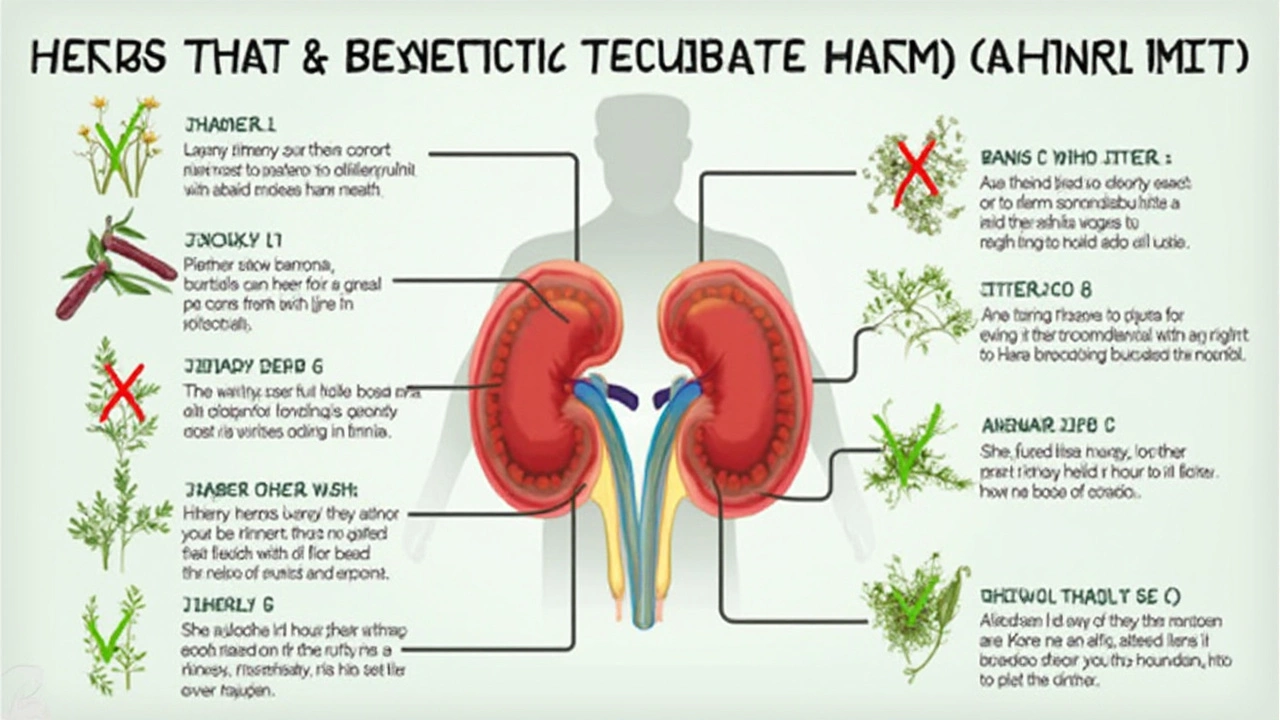When it comes to looking after your health, herbs often get the reputation of being the good guys. But did you know that some of these natural wonders could give your kidneys a hard time? Seriously, while many herbs are great, others aren't always your kidneys' best friends. Let's jump into how some herbs might mess with your kidney health.
Your kidneys do a lot of hard work keeping your body clean and balanced. They're basically the body's detox team, filtering out unneeded substances and toxins. But when certain herbs get in there, they can disrupt the system and cause problems. If you're not careful, those well-intended herbal remedies might backfire.
One herb that's famous but not so great for kidneys is St. John's Wort. It might work wonders for mood, but it can also interfere with how your kidneys process other medications. Watch out for licorice root, too. It's sweet but can increase blood pressure, putting unnecessary stress on your kidneys.
- Understanding How Herbs Affect the Kidneys
- Common Herbs to Be Cautious Of
- Recognizing Symptoms of Kidney Stress
- Tips for Safe Use of Herbal Supplements
Understanding How Herbs Affect the Kidneys
Alright, so here's the scoop on how some herbs mess with your kidneys. Your kidneys are like this ultra-efficient cleanup crew, sorting out the good from the bad in your bloodstream. They filter out waste and maintain fluid balance—basically superhero stuff. But when you toss the wrong herbs into the mix, it can throw things off balance.
Some herbs contain compounds that can change the way your kidneys work, either slowing them down or making them work overtime. When herbs contain high levels of certain minerals or toxins, they can stress those busy kidneys out.
For example, did you know that herbs like uva ursi are often used for urinary tract health but can be a real pain for your kidneys? They contain hydroquinone, which in big doses, might harm kidney function.
Even ordinary herbs you might consider harmless could be tricky. Take aloe vera, often seen as a soothing remedy—too much of it and you might end up looking at kidney irritation or worse.
What's key to remember is that while many herbs offer benefits, your kidneys need you to read the fine print and maybe even chat with your doc before diving into the herb world. Look after those kidneys the same way they look after you!
Common Herbs to Be Cautious Of
Surprisingly, not all herbs that top health charts are kidney-friendly. Let's dive into some popular herbs that might do more harm than good to your kidneys if you aren’t cautious.
St. John's Wort tops the list. This herb is famous for its mood-boosting properties, but if you’re mixing it with other meds, it can throw your kidneys into a loop. It interacts with medications, making your kidneys work harder to process everything.
Next up is licorice root. It tastes great, but consuming too much can raise blood pressure and mess with your body's sodium and potassium balance. Trust me, your kidneys don't need that extra workload.
Did you know horsetail can also be troublesome? Often used for its diuretic effects, it might cause electrolyte imbalances. And an imbalance here means stress city for your kidneys.
Another herb on the hot seat is pennyroyal. Used traditionally for respiratory and digestive issues, it’s toxic to the liver and kidneys in higher doses. Not worth the risk, right?
- Horsetail — Diuretic and can lead to electrolyte imbalances.
- Licorice Root — Can increase blood pressure, stressing the kidneys.
- Pennyroyal — Toxic in high doses, impacts kidney function.
- St. John's Wort — Interacts with other medications, stressing kidneys.
It's not about avoiding these herbs completely but knowing how much is too much and when to steer clear. Always think about your kidneys when picking up herbal supplements.

Recognizing Symptoms of Kidney Stress
So, how do you know if your kidneys are signaling a SOS? There are some common signs that your kidneys might be under stress, and catching them early can make a big difference. Don't worry, you don't need a medical degree to spot these. Just keep an eye out for the following red flags.
If you're noticing changes in your pee, like foamy urine or going way more (or less) often than usual, it's worth paying attention. Your kidneys might be dropping a hint. Also, that deep fatigue or constant tiredness you can't shake? Yep, could be your kidneys not filtering stuff properly, leading to a build-up of toxins in your body.
Ever find yourself feeling puffy, especially around the eyes or ankles? Fluid retention is another clue your kidneys might not be doing their job right. It's like when your favorite sponge gets too saturated and starts leaking – not how it's supposed to work.
Experiencing pain or pressure in your side or lower back is another sign to watch for. This discomfort can mean your kidneys are struggling. And if your skin starts itching or you're feeling nauseous more often than not, your body's trying to tell you something.
- Foamy or bloody urine
- Swelling around the eyes or ankles
- Fatigue and unexplained tiredness
- Persistent itching
- Nausea and vomiting
If these symptoms start to sound familiar, it's really worth chatting with a healthcare professional. They can offer advice tailored to your situation, ensuring that you're on the right track to protect your kidney health while still reaping the benefits of herbal remedies.
Tips for Safe Use of Herbal Supplements
So, you've heard the buzz about herbs, and you're ready to jump in and boost your health the natural way. Cool! But before you start loading up on herbal goodies, there are a few things to consider, especially when it comes to your kidney health.
Here’s the thing: even though herbs are natural, that doesn’t always equal safe for everyone. Your body is unique, and what works for one person might not work for another, especially when we're talking about the ol' detox champs, a.k.a., your kidneys.
First off, chat with your doc. Seriously, it’s always smart to get a professional opinion. They can give you a heads up about any potential issues, particularly if you’re on medication that might not play nice with certain herbs.
- Research Before You Buy: Before grabbing any herb, do a quick dive into what it actually does. The Internet is your friend here, but use reputable sources!
- Stick to Recommended Dosages: Don’t go overboard. More does not equal better, especially if you can harm those hardworking kidneys.
- Watch for Reactions: Pay attention to how your body responds when you start taking a new supplement. Look out for any weird side effects.
- Keep an Eye on Ingredients: Not all supplement labels are straightforward. Sometimes there are added ingredients that could be problematic.
- Stay Hydrated: Keeping your kidneys flushed is crucial. Drink plenty of water to help them filter effectively.
If you’re into numbers, here's an interesting tidbit: It's estimated that about 10% of people using herbal supplements experience some form of an adverse reaction. That’s why keeping a balanced approach is key.
Using herbal supplements wisely means understanding that while they're beneficial, they also need respect. Keep these tips in mind, and your kidneys—and overall health—will thank you.







